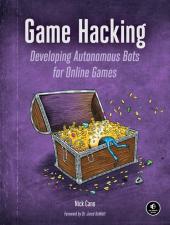Download Chapter 9: Using Extrasensory Perception to Ward Off Fog of War
“Game Hacking contains more than just interesting material; it contains an education. Budding programmers and game designers will gain critical insights. Perhaps, for someone with the predisposition and the will to develop their skills, this book could even kick-start a new career.”
—Josh Townsend, IT Security
You don’t need to be a wizard to transform a game you like into a game you love. Imagine if you could give your favorite PC game a more informative heads-up display or instantly collect all that loot from your latest epic battle.
Bring your knowledge of Windows-based development and memory management, and Game Hacking will teach you what you need to become a true game hacker. Learn the basics, like reverse engineering, assembly code analysis, programmatic memory manipulation, and code injection, and hone your new skills with hands-on example code and practice binaries.
Level up as you learn how to:
- Scan and modify memory with Cheat Engine
- Explore program structure and execution flow with OllyDbg
- Log processes and pinpoint useful data files with Process Monitor
- Manipulate control flow through NOPing, hooking, and more
- Locate and dissect common game memory structures
You’ll even discover the secrets behind common game bots, including:
- Extrasensory perception hacks, such as wallhacks and heads-up displays
- Responsive hacks, such as autohealers and combo bots
- Bots with artificial intelligence, such as cave walkers and automatic looters
Game hacking might seem like black magic, but it doesn’t have to be. Once you understand how bots are made, you’ll be better positioned to defend against them in your own games. Journey through the inner workings of PC games with Game Hacking, and leave with a deeper understanding of both game design and computer security.



